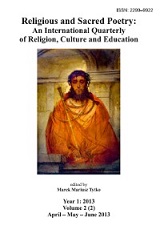The Symbolic and Allegorical Parallel “Kiev – Jerusalem”
The Symbolic and Allegorical Parallel “Kiev – Jerusalem”
Author(s): Olga BigunSubject(s): Language and Literature Studies
Published by: Fundacja Naukowa Katolików »Eschaton«
Keywords: mythology; the Bible; Jerusalem; Kiev; Taras Shevchenko
Summary/Abstract: This article is a part of the bigger work entitled The Ambivalence of Byzantism in Taras Shevchenko’s Writings. The aim of the article is studying the problem of perception and interpretation of the mytheme of Jerusalem in the works by Taras Shevchenko. The crosscultural, semiotic, hermeneutic and comparative analyses allow for discovering deep semantic levels of the “Jerusalem” loci in the works by T. Shevchenko, for clearing out its subtexts and for defining its poetic structure and the levels of the artistic interpreta-tion. In the result of the analyses it has been found that the association “Kiev–Jerusalem” in the works by Shevchenko has its loci of various mean-ings, which have been formed in the course of a long trajectory within the historic space. The mytheme “Jerusalem” is realized primarily in its Biblical and genetic aspect. The contents of the “Jerusalem idea” proves Shevchenko’s solid knowledge of the Old Testament dogmas in the field of the Judaic history and culture. The resemblance of/between Kiev and Jerusa-lem is formed on the basis of [the] allegories, the poetical means aiming at the context reading with regard to the urgent social and historic reality. Introducing the mytheme “Jerusalem” into a discourse of fiction, T. Shevchenko accounts for actualization/transposition of its Biblical semantic field/range unto the social, political, cultural and spiritual needs of the epoch. The image of Kiev in Shevchenko’s works has strong sacred characteristics/connotations which indirectly correlate with Christian viewpoints. The importance of Kiev as the spiritual habitable globe is underlined by frequent recollections about numeruous temples, monasteries, saints, monks, icons, pilgrimage traditions, etc. The results of the research can be used for courses in the Ukrainian History of Literature and Theory, for text-books and training aids, for further comparative studies of Shevchenko’s works. The results of the study are addressed to philologists and researchers of the Ukrainian literature. The academic novelty of this article lies in the fact that the mytheme “Jerusalem” in Shevchenko’s works has for the first time become the object of individual research and that theoretic aspects and comparative typological levels of this problem have been elaborated.
Journal: Religious and Sacred Poetry: An International Quarterly of Religion, Culture and Education
- Issue Year: 2013
- Issue No: 2
- Page Range: 85-96
- Page Count: 12
- Language: English

